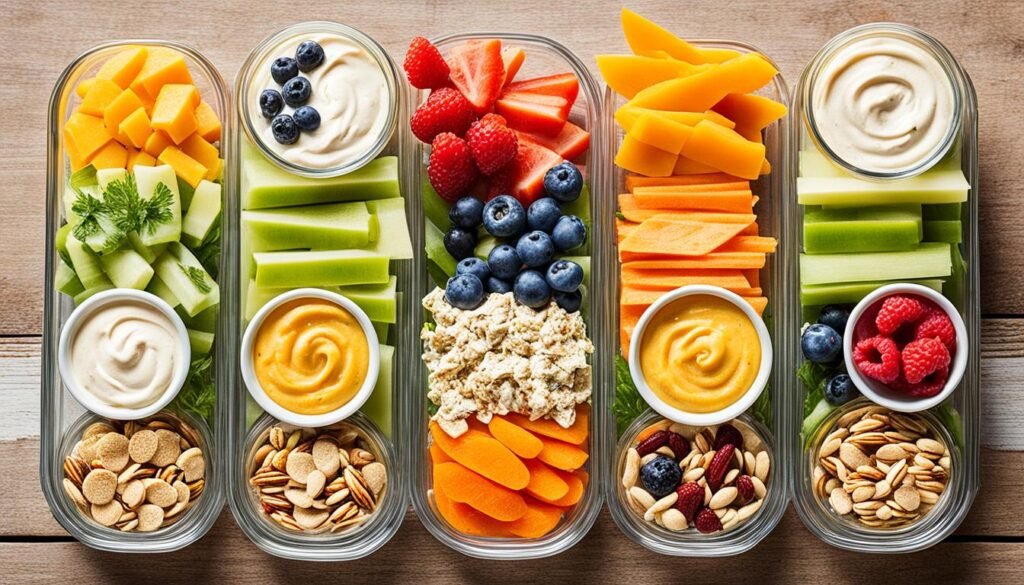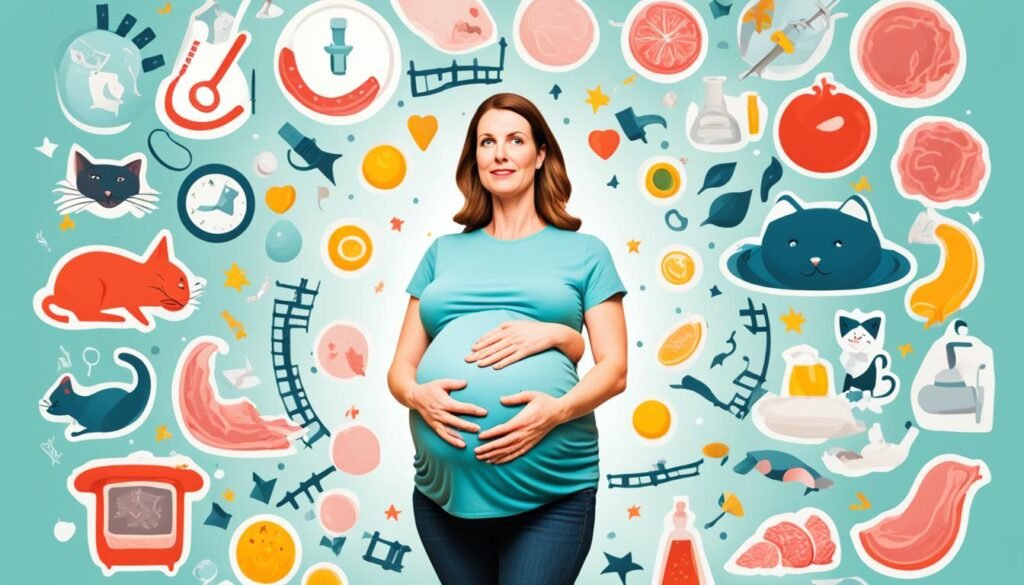Pregnancy brings many myths and false ideas. This can make moms-to-be wonder what’s truly safe for them and their babies. Things like what to eat, if it’s okay to work out, or even whether you can dye your hair, spark many “dos” and “don’ts.” They come from caring but sometimes wrong folks.
Key Takeaways : Myths About Pregnancy
- Pregnancy is a time when many myths and misconceptions about health and safety circulate.
- Expectant mothers are often bombarded with conflicting information from well-meaning but misinformed sources.
- It’s important to separate fact from fiction and consult with healthcare professionals to ensure a healthy pregnancy.
- Many common pregnancy myths, such as the belief that exercise and caffeine should be avoided, are unfounded.
- Staying informed and listening to your body can help you navigate the joys and challenges of pregnancy with confidence.
Introduction
Pregnancy comes with lots of myths and misconceptions about staying safe and healthy. People talk about what to eat, how to stay fit, and even if you can dye your hair while pregnant. Often, pregnant women get advice from family, friends, and strangers.
Pregnancy Myths: Separating Fact from Fiction
This section will clear up some common pregnancy myths. We want to provide the facts. This way, expectant mothers can make choices that keep them and their babies healthy.
Common Misconceptions About Pregnancy
Pregnancy changes a woman’s life and body in amazing ways. It’s key for women to get the right info. By getting rid of common myths, we help pregnant women have a smooth and healthy pregnancy.
Myth: You Can’t Exercise During Pregnancy
Some people believe a myth that women shouldn’t exercise when they are pregnant. However, this is not correct. Working out while pregnant actually has many advantages. It helps the mother and the baby.
Benefits of Exercising During Pregnancy
Exercising helps pregnant women stay at a healthy weight. It also boosts heart health and lowers the risks of preterm birth and gestational diabetes. Plus, it eases backaches, makes you less tired, and reduces swelling.
Moreover, it’s good for the mind. It gets you ready for giving birth.
Recommended Exercises for Expectant Mothers
American College of Obstetricians and Gynecologists (ACOG) say pregnant women should do at least 150 minutes of moderate aerobic exercise each week. This could be brisk walking, swimming, or cycling. It recommends doing strength exercises and prenatal yoga and Pilates too.
Before starting any new exercise, expectant mothers should talk to their doctor. A healthcare provider can recommend the best activities. They consider the mother’s health, fitness, and pregnancy stage.
Myth: You’re Eating for Two
Many think pregnant women should eat twice as much for their baby. While it’s true moms-to-be need extra calories for their baby’s growth, doubling what you eat is wrong. It can cause bad weight gain.
Proper Weight Gain During Pregnancy
The American College of Obstetricians and Gynecologists says most pregnant women should gain 25 to 35 pounds. This varies based on the woman’s starting body mass index. Too much or too little weight gain brings risks like gestational diabetes. It can also harm the mother and baby’s health.
Healthy Snacking for Expectant Mothers
Instead of more food, focus on balanced nutritious meals and healthy snacks. Have two to three protein servings daily, like chicken, eggs, or omega-3 fish. Eat lots of fruits, vegetables, and whole grains. This ensures you and your baby get the right vitamins, and minerals.
Listen to your body. Adjust your food intake as needed. This helps keep your weight gain on track and supports your baby’s growth.
myths about pregnancy
Pregnancy comes with a lot of myths and misunderstandings. This includes wrong beliefs about having sex and how you should groom yourself. Now, let’s clear up some common myths in these areas.
Sex During Pregnancy: Myths and Facts
Some people think sex during pregnancy is risky and could harm the baby. But for most women, sex is perfectly safe and even healthy during all stages of pregnancy without complications. The baby is very well protected inside the womb. So, having sex doesn’t make you more likely to have a preterm birth or other issues. The American College of Obstetricians and Gynecologists (ACOG) says sex during pregnancy is safe overall, unless your doctor says it’s not for you due to certain medical conditions.
Debunking Hair Dye and Nail Salon Myths
There’s a big myth that hair dye and going to nail salons could be risky when you’re pregnant. But, it’s wise to talk to your ob-gyn about concerns just to be safe. The ACOG reassures us that using hair dye sometimes and taking care of your nails at trusted places is usually fine during pregnancy. The ingredients they use aren’t thought to cause birth defects or harm the baby in other ways.
Yet, always pay attention to how you feel. Steer clear of things that worry you. And when you’re in doubt, it’s best to ask your doctor. They can tell you what’s best for keeping you and your baby safe and healthy.
Myth: Caffeine Should Be Avoided Completely
Many believe pregnant women must cut out caffeine entirely. In reality, a small dose is usually fine and might even help. But remember, too much can cause problems.
Moderate Caffeine Intake During Pregnancy
The American College of Obstetricians and Gynecologists say it’s safe for moms-to-be to have 200 milligrams of caffeine a day. That’s like two 8-ounce cups of coffee. Drinking it in moderate amounts can ease headaches and tiredness.
Also Read : What Are Some Famous Ancient Myths and Legends?
Pregnant women should check in with their own bodies. How much caffeine you can handle might change as pregnancy goes on. Some find they’re okay with a bit more caffeine in the first months, especially if they’re battling morning sickness. Others might need to cut back more later on. The most important thing is to talk to your doctor. They’ll help you find the best plan for you.
During pregnancy, many myths surround what a pregnant woman should and shouldn’t do, from how much caffeine is safe to consume to whether she should eat for two. While some believe that dyeing hair can harm the baby, others worry about the risk of toxoplasmosis from handling cat litter. Obstetricians and gynecologists advise on managing weight gain and addressing morning sickness, heartburn, and preterm birth concerns.
They also caution against certain activities like hot tub use and eating raw seafood, as they may cause complications. The first trimester, when the placenta forms, is crucial, and pregnant women should be mindful of their health, perhaps wearing gloves while dealing with potentially harmful substances like cat feces to prevent toxoplasmosis.
FAQs
Q: What are some common myths about pregnancy?
A: There are several myths surrounding pregnancy such as the belief that you need to “eat for two”, that you can’t drink any coffee during pregnancy, or that having heartburn means your baby will have a lot of hair.
Q: Is it safe to drink coffee during pregnancy?
A: It is generally safe for pregnant women to consume moderate amounts of caffeine, including coffee. However, it’s best to consult with your healthcare provider to determine the appropriate level of caffeine intake for you.
Q: Can pregnant women use hot tubs?
A: It is recommended for pregnant women to avoid hot tubs as the high temperatures can be harmful to the developing baby. It’s better to opt for a warm bath instead.
Q: What seafood should be avoided during pregnancy?
A: Pregnant women should avoid consuming seafood high in mercury such as shark, swordfish, king mackerel, and tilefish. It’s safer to opt for low-mercury options like shrimp, salmon, and catfish.
Q: How can pregnant women safely handle litter boxes?
A: To reduce the risk of contracting toxoplasmosis from cat feces in the litter box, pregnant women should wear gloves while cleaning it. It’s also advisable to have someone else clean the litter box if possible.
Q: Is it safe to have a glass of wine during pregnancy?
A: It’s best to avoid alcohol altogether during pregnancy to prevent any potential harm to the baby. Even small amounts of alcohol can pose risks to the developing fetus.
Q: Why is it important to debunk pregnancy myths?
A: Debunking common myths about pregnancy is crucial to ensure that expecting mothers have accurate information and make informed decisions about their health and the well-being of their baby. Following evidence-based guidance can lead to a healthier and safer pregnancy journey.
Source Links
- https://www.universityhealth.com/blog/fact-vs-fiction-common-pregnancy-myths-debunked
- https://www.scripps.org/news_items/3039-9-common-pregnancy-myths-debunked
- https://utswmed.org/medblog/debunking-common-pregnancy-myths/







